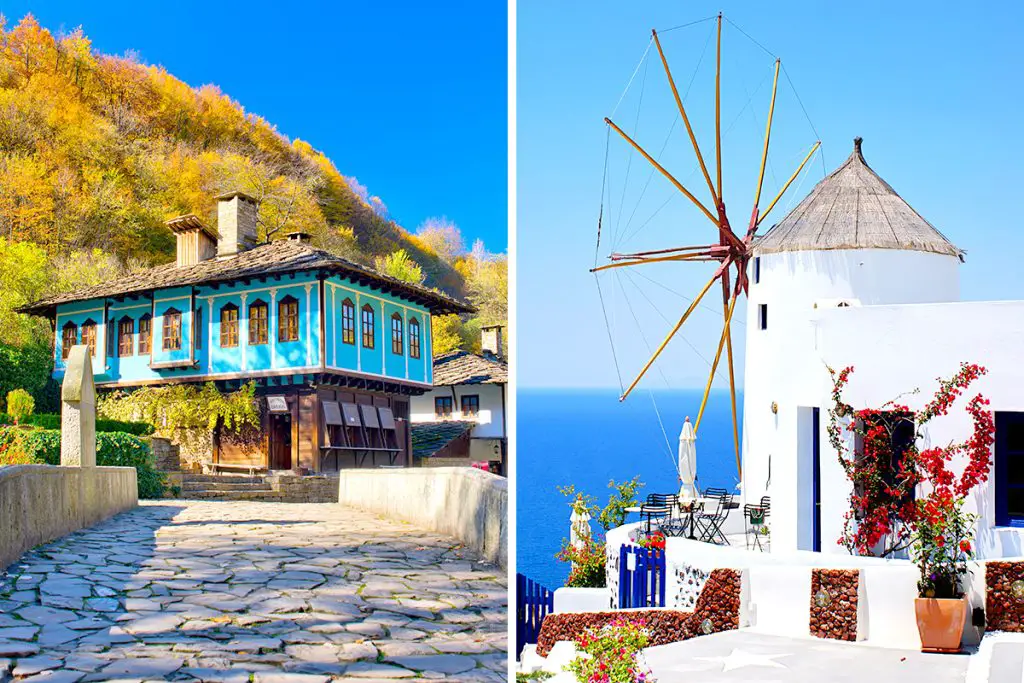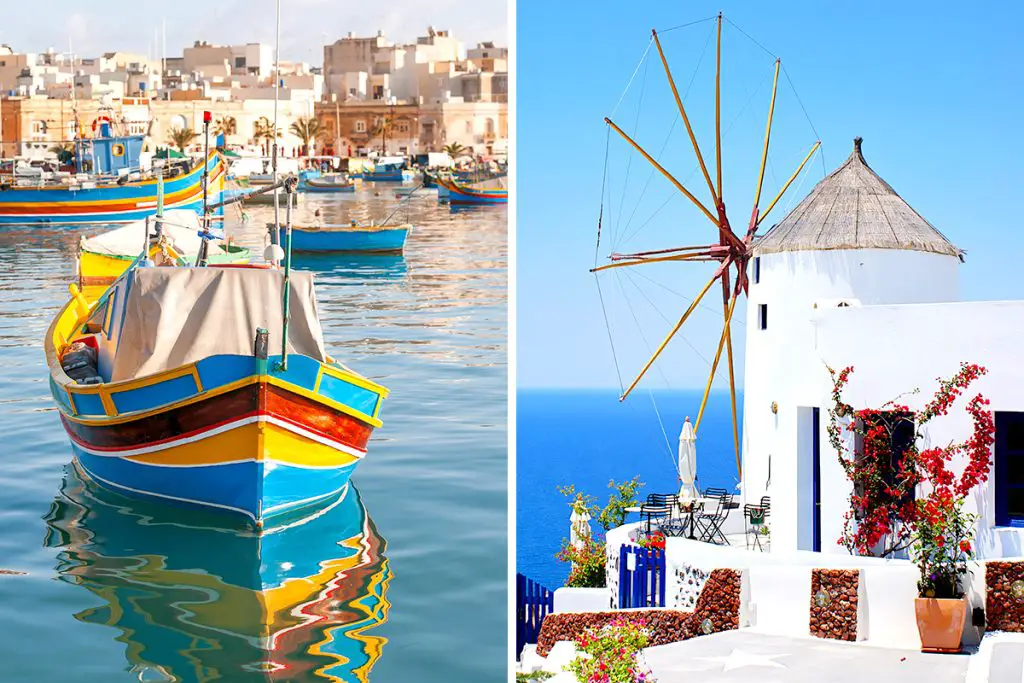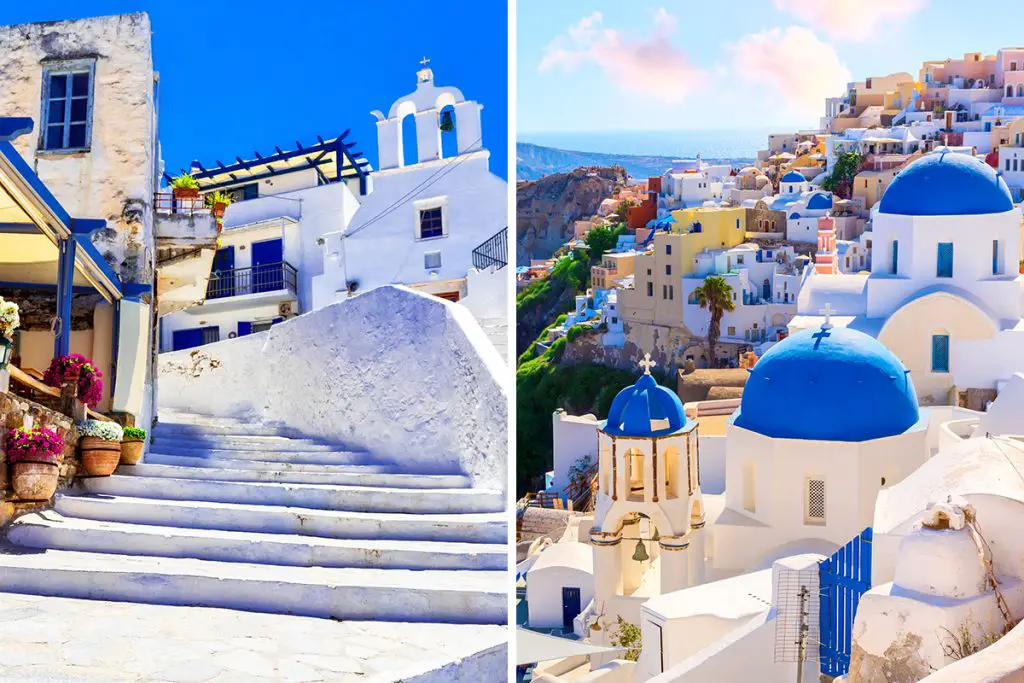Unveiling the tales embedded in the soil of Albania and Greece is like stepping into a living tapestry of civilizations. As you traverse through time, the whispers of the old worlds tell stories of valor and wisdom. Your journey through the annals of history begins here, but which country’s past will entice your spirit more? Read on to delve deeper into the ancient heartbeat that still pulsates through the lands of Albania and Greece.
History & Culture
The ancient roots of Albania and Greece are deeply intertwined with the fabric of Europe’s past. Both lands bear witness to the rise and fall of empires, each holding a unique mirror to the bygone eras.
Albania’s history is a rich tapestry of Illyrian, Roman, Byzantine, and Ottoman influences. Its culture is a captivating blend of traditions that have stood the test of time, amidst the towering mountains and serene lakes that cradle its ancient tales. The Albanian language is a treasure, a standalone branch in the Indo-European language tree, carrying whispers of its unique past.
Greece, on the other hand, is the cradle of Western civilization. Its history is an odyssey of ideas that shaped the world. From the philosophical musings of Socrates to the valiant exploits of Alexander the Great, Greece’s past is a beacon of human endeavor.
The Greek culture, with its profound philosophical insights and dramatic arts, has left an indelible mark on the world’s stage.
Comparing the historical and cultural ethos of Albania and Greece is like comparing the hues of dawn and dusk. Both are captivating yet distinct in their narrative. While Albania offers a journey through diverse cultural influences under the veil of mystery, Greece provides a vivid stroll through the high tides of human thought and civilization.
Your exploration through the historical and cultural realms of Albania and Greece is bound to leave you with a trove of insights. Each country, with its unique blend of past narratives and cultural fabric, offers a rich palette for your historical and cultural indulgence. Your journey through the essence of time in Albania and Greece is not just a travel itinerary; it’s an exploration of human civilization’s rich tapestry.
Attractions & Activities
Embarking on a journey through the attractions and activities of Albania and Greece is akin to unearthing hidden gems and reveling in the adventures that lie in wait. Each country offers a unique tableau of experiences, painting a colorful spectrum of memories for the eager explorer.
Albania beckons with its rugged natural terrain, offering a plethora of hiking and trekking opportunities. The Accursed Mountains, with their lofty peaks, provide a haven for the adventurous soul.
Hiking trails here unveil enchanting vistas and the ancient village of Theth, a living relic of Albania’s pastoral heritage. Albania’s historical attractions like the Gjirokastër Castle and the ancient ruins of Butrint also offer a sneak peek into the nation’s past.
Greece, on the other hand, invites you to step into a world where mythology breathes life into the surroundings. The ancient ruins of Athens, such as the Acropolis and the Temple of Olympian Zeus, offer a window into a civilization that shaped the modern world.
Beyond the echoes of the past, Greece’s beautiful landscapes in Meteora and the Samaria Gorge beckon for a thrilling exploration, whether you are hiking or simply soaking in the natural beauty.
While Albania is a treasure trove for those seeking a blend of outdoor adventures and historical exploration, Greece enchants with its legendary past and stunning natural sceneries. The choice between delving into the mysteries of ancient ruins or trekking through pristine landscapes presents a delightful dilemma for the discerning traveler.
Beaches
The allure of the sun-kissed shores of Albania and Greece is an invitation to bask in the natural beauty that these Mediterranean gems have to offer. The turquoise waters and golden sands are a picture-perfect canvas, awaiting your discovery.
Albania’s coastline, stretching for about 476 kilometers (296 miles), is adorned with quaint beaches like Dhërmi and Jale Beach, where the crystal-clear waters meet the rugged coastline creating a serene escape for the solitude seeker. The untouched beauty of Albania’s shores is a stark contrast to the bustling beaches of its neighbor.
Greece, with its extensive coastline of approximately 13,676 kilometers (8,498 miles), hosts an array of famous beaches like Myrtos Beach in Kefalonia and Navagio Beach in Zakynthos, known for their stunningly clear waters and picturesque settings. The idyllic scenery here is often complemented by the historical ruins that dot the coastline, adding a touch of mystique to your beach escapade.
The contrast between the tranquil, lesser-known beaches of Albania and the globally acclaimed shores of Greece reflects the different rhythms of beach life you’d experience in each country. While Albania offers a quiet retreat, Greece provides a more classic beach experience with a touch of ancient elegance.
Summing up, the beach landscapes of Albania and Greece are a testament to the Mediterranean’s natural allure. The distinct beach experiences in these countries cater to different preferences, whether you seek solitude or the charming ambiance of well-trodden sands amidst ancient ruins. Your quest for the perfect beach escape finds a rich playground in the contrasting yet equally captivating shores of Albania and Greece.
Eating, Drinking & Nightlife
The culinary journey through Albania and Greece is a delightful exploration of traditional flavors and modern allure. Each nation holds its unique gastronomic charm, promising a delightful experience for your taste buds.
Albania’s culinary scene is a delightful blend of Ottoman, Greek, Italian, and Balkan influences. Traditional eateries serve comforting dishes like tavë kosi (baked lamb with rice) and byrek (a savory pie). The rustic charm of Albania’s eateries provides a cozy atmosphere for enjoying hearty meals.
Greece, famed for its olive oil, feta, moussaka, and souvlaki, offers a rich culinary landscape. The traditional tavernas and modern eateries serve dishes that have traveled through time, offering a taste of history with every bite.
When it comes to drinking, Albania’s local spirits like raki are a highlight, often enjoyed in the quaint local bars or traditional restaurants. The warmth of Albanian hospitality shines through in the casual drinking scenes across the country.
In Greece, ouzo and tsipouro lead the way, embodying the spirit of Greek conviviality. The vibrant wine culture also beckons, with vineyards and wineries offering a taste of the ancient and revered Greek wine tradition.
The nightlife in Albania is a blend of modern beats and traditional tunes, with Tirana housing some lively bars and clubs where you can dance the night away.
On the other hand, the nightlife in Greece, especially in places like Athens and Thessaloniki, pulses with energy, offering a mix of lively bars, nightclubs, and music venues that echo with the rhythms of modern and traditional music.
In conclusion, the adventure through the culinary, drinking, and nightlife scenes of Albania and Greece is a festive celebration of traditions and modernity. The unique flavors, spirited drinking culture, and energetic nightlife promise a rich tapestry of experiences awaiting your exploration.
Shopping
The bustling markets and quaint shops of Albania and Greece are a window into the unique crafts, traditions, and modern trends of these nations. Each marketplace is a vibrant tapestry of colors, sounds, and aromas, promising a delightful shopping experience.
In Albania, the local markets are a treasure trove of handcrafted goods, traditional attire, and unique souvenirs. The bazaars in cities like Tirana and Shkodër offer a myriad of artisanal items, from handwoven textiles to intricately crafted jewelry. Every purchase here feels like bringing home a piece of Albania’s rich cultural tapestry.
Greece, with its well-established shopping venues in Athens and Thessaloniki, offers a blend of high-end boutiques, traditional shops, and modern malls. The charming streets of Plaka in Athens are adorned with shops selling handmade ceramics, jewelry, and iconic Greek sandals.
Moreover, the elegant boutiques in Kolonaki offer a taste of Greece’s modern fashion and design scene.
In summary, the shopping scenes in Albania and Greece are a journey through the modern and the ancient, the traditional and the contemporary. Each country offers a unique shopping narrative, promising a delightful expedition through the colorful marketplaces and elegant boutiques that dot the urban and rural landscapes. Whether you are a lover of traditional crafts or modern designs, the shops in Albania and Greece have something special to offer for every discerning shopper.
Accommodation
Nestling into the comforting embrace of a cozy accommodation is part of the allure when exploring the realms of Albania and Greece. Both countries offer a spectrum of lodging experiences, each with its unique charm and signature hospitality.
In Albania, the accommodation spectrum ranges from quaint guesthouses nestled in the heart of ancient towns, to modern hotels in urban centers like Tirana. The traditional stone houses in Gjirokastër offer a rustic charm, providing a quaint experience of Albanian hospitality.
Greece, with its plethora of islands and ancient cities, offers a wide array of accommodations. From luxury resorts in Santorini to traditional guesthouses in the mountainous regions, Greek hospitality is eminent. The iconic white-washed villas with blue domes overlooking the Aegean Sea are a hallmark of the Greek accommodation scene.
The serene ambiance of Albania’s lodgings provides a peaceful retreat, while Greece’s accommodations often provide a more luxurious or picturesque setting. Both countries, however, promise warm hospitality that makes you feel at home.
Family-Friendliness & Children’s Activities
Embarking on a family expedition to Albania and Greece unveils a realm of exciting adventures and heartwarming experiences. Both nations cherish family values, reflected in the plethora of activities designed for children.
Albania, with its expansive natural landscapes, provides a playground for adventurous families. The scenic trails in the national parks like Theth and Valbona offer a thrilling exploration for older children, while the historical castles ignite the imagination of the young ones.
Greece, on the other hand, is a treasure trove of mythological tales and ancient ruins that provide an educational yet exciting backdrop for children’s adventures. The interactive museums in Athens and the ruins of ancient temples and theaters across the country are both educational and fascinating for children.
In summary, the family-friendly aura and the diverse children-friendly activities make Albania and Greece delightful destinations for a memorable family expedition. The blend of natural, historical, and cultural explorations provides a rich educational and adventurous playground for children and families alike.
Getting There & Getting Around
The journey to and around Albania and Greece unfolds a narrative of exploration and adventure. Both countries are accessible gateways to the charming allure of the Mediterranean.
Getting to Albania typically involves flying into the Tirana International Airport Nënë Tereza, which is about 17 kilometers (10.5 miles) from the heart of Tirana. From there, a network of buses and taxis provides the link to various parts of the country.
In Greece, the Athens International Airport is a major hub, situated 33 kilometers (20.5 miles) east of central Athens. The country’s extensive ferry network also provides access to the myriad of beautiful islands, making the journey a part of the adventure.
Once in Albania, the mode of transportation includes buses, taxis, and the quaint furgons (shared minivans). Though the public transportation system is quite extensive, the schedules might be a bit irregular.
In Greece, public transportation is more structured with an extensive network of buses, metros, and ferries. The islands are especially well-connected by ferries, and the metro system in Athens is efficient and easy to navigate.
Summarizing, the journey to and exploration within Albania and Greece is an adventure in itself. The contrast in the transportation infrastructure between the two countries reflects the unique travel experiences they offer. Whether by land or by sea, the exploration of these Mediterranean gems unveils a journey filled with discoveries and picturesque landscapes.
Weather
The allure of Mediterranean climates in Albania and Greece is a beckoning call to travelers seeking pleasant weather for their adventures. Both countries offer a range of weather patterns, each with its distinct beauty across the seasons.
Albania experiences warm summers with temperatures often soaring to around 86°F (30°C), particularly in July and August. The winters are relatively mild, especially along the coast, with temperatures in January hovering around 55°F (13°C). The inland areas experience cooler winters with more precipitation.
Greece, on the other hand, is known for its hot and dry summers, especially in the islands and coastal areas where temperatures in July and August can reach up to 95°F (35°C) or higher. The winters are mild along the coast with January temperatures averaging around 57°F (14°C), while the mountainous regions see colder temperatures and snowfall.
Both countries enjoy a generous amount of sunshine throughout the year, particularly during the summer months. However, the spring (March to May) and fall (September to November) seasons offer more temperate climates, making these periods ideal for exploring the outdoors.
The distinct Mediterranean climate of Albania and Greece provides a warm and inviting ambiance, though the seasonal variations cater to different preferences. Whether you seek the warmth of summer or the mild charm of winter, both countries offer a delightful weather experience tailored to your adventuring spirit.
Safety
The realm of safety is a pivotal aspect to consider when planning a voyage to Albania and Greece. Both nations uphold a sense of security, ensuring a serene environment for explorers.
Albania has been steadily growing as a safe destination for travelers. The local communities are known for their hospitality and willingness to assist visitors. Greece too, is recognized for its safety and friendly locals who are often willing to go the extra mile to aid travelers.
In terms of unique non-crime-related safety topics, both countries are situated in seismic zones, which means that earthquakes are a part of the natural landscape. It’s a perennial factor, and buildings and infrastructure are designed to withstand seismic activities to ensure public safety.
The approach towards safety in both Albania and Greece reflects the hospitable and protective nature of the communities. While no place is devoid of risks, the prevailing safety measures and the congenial attitude of the locals contribute to a sense of security.
In essence, the safety landscape in Albania and Greece is fostered by a blend of community vigilance and structural preparedness. The friendly demeanor of the locals coupled with the established safety protocols ensures a peaceful and enjoyable voyage through these Mediterranean havens.
Cost
Embarking on a voyage through Albania and Greece unveils a spectrum of cost dynamics. Both nations offer a range of experiences catering to different budget preferences.
In Albania, the cost of living is relatively lower compared to Greece. For instance, a meal at a modest restaurant might cost around 700 Albanian Lek (around $7) while in Greece, a similar meal might cost around €12 (around $13). Lodging in Albania also tends to be more budget-friendly with a variety of options from hostels to mid-range hotels.
Greece, being a more popular tourist destination, tends to have higher prices, especially in the tourist hotspots like Athens and Santorini. The cost of accommodation, food, and transportation is generally higher, reflecting the country’s popularity on the global tourism stage.
Transportation within cities and between different regions in both countries also reflects a cost difference. While Albania has a less expensive but less structured public transportation system, Greece has a more developed but slightly pricier transportation network.
In summary, the cost dynamics in Albania and Greece cater to a variety of budgetary preferences. Whether you are on a shoestring budget or looking for a more luxurious experience, both countries offer a range of options to ensure a memorable adventure without breaking the bank.
Which Is Better – Albania or Greece?
Embarking on a journey through the rich tapestries of Albania and Greece unveils a myriad of experiences awaiting the discerning traveler. The distinct narratives of both nations offer a unique voyage through history, culture, and the natural beauty of the Mediterranean.
The historical and cultural panorama of Albania and Greece is a voyage through time. While Albania enchants with its blend of diverse cultural influences and a veil of mystery, Greece offers a vivid stroll through the high tides of human thought and ancient civilization.
The dance of ancient cultures across time paints a vivid backdrop for both nations, each holding a unique mirror to bygone eras.
In the realm of attractions and activities, Albania beckons with its rugged terrain and historical relics, offering a blend of outdoor adventures and a peek into the nation’s past. Greece, on the other hand, invites you to step into a world where mythology breathes life into the surroundings, with a plethora of ancient ruins and stunning natural landscapes awaiting exploration.
The sun-kissed shores of Albania and Greece offer contrasting beach experiences. While Albania’s tranquil, lesser-known beaches provide a quiet retreat, Greece’s globally acclaimed shores offer a classic beach experience with a touch of ancient elegance, making each destination a picturesque escape.
The culinary expedition through Albania and Greece is a fest of traditional flavors. While Albania’s rustic charm provides a cozy atmosphere for hearty meals, Greece’s rich culinary landscape offers a taste of history with every bite.
The nightlife in both countries ranges from the modern beats in Albania to the energetic rhythms in Greece, each offering a unique taste of local culture and entertainment.
The accommodation spectrum in Albania and Greece caters to a range of preferences. Albania offers quaint guesthouses and modern hotels, while Greece enchants with its iconic white-washed villas and luxury resorts, each providing a unique backdrop to your adventures.
In summary, the choice between Albania and Greece boils down to personal preferences and the kind of experiences you seek. For a tranquil retreat amidst rugged landscapes and historical mysteries, Albania is a hidden gem waiting to be discovered. If a voyage through ancient civilizations, iconic beaches, and a rich culinary tradition appeals to you, Greece stands as a timeless destination.
Each country, with its unique blend of experiences, promises a journey filled with discoveries, enriching your wanderlust with cherished memories and captivating stories.







